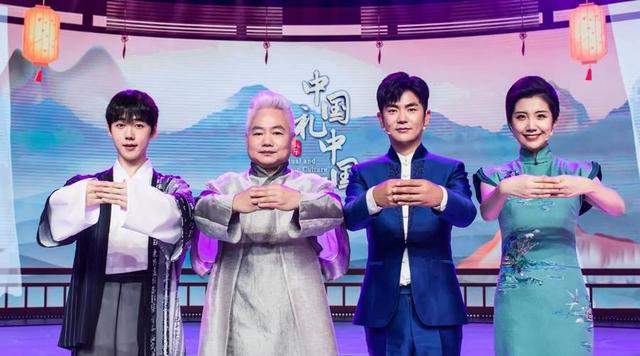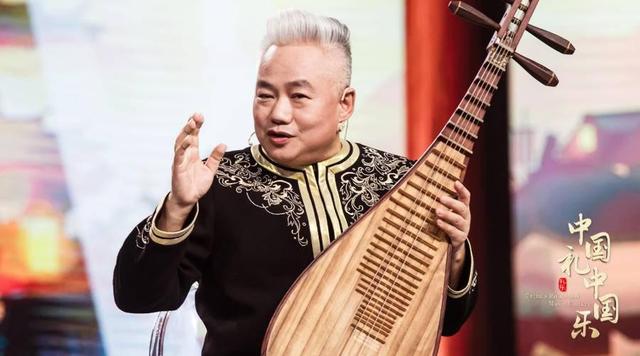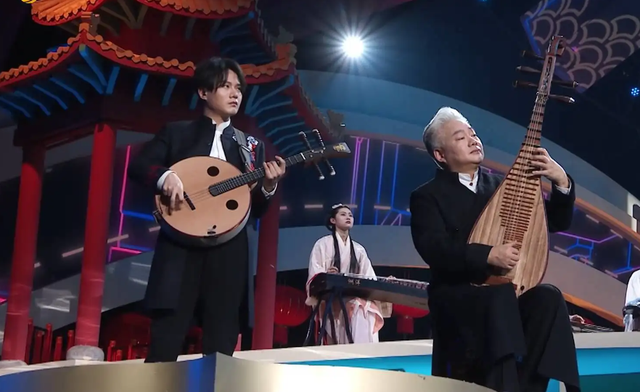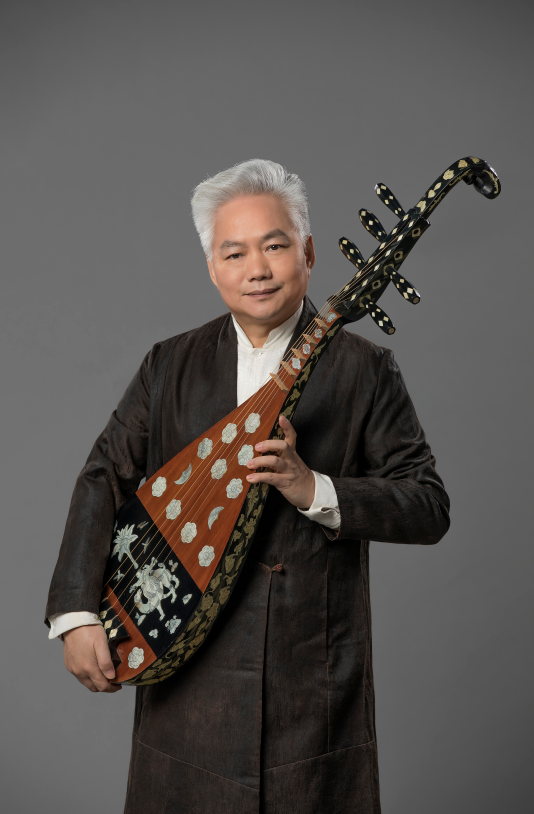Fang Jinlong, the watcher of traditional culture: wants to be Bruce Lee in the music industry
Fang Jinlong, a famous Chinese music artist and the representative of contemporary five-stringed pipa, can be described as a top-notch musician in the field of folk music. Very high degree. Fang Jinlong has been in the arts for more than 40 years. He can play more than 100 kinds of national musical instruments around the world, and has visited more than 50 countries and regions. He is known as the "traditional culture watcher".

Fang Jinlong is also a "fashioner" of traditional Chinese music. During the 11-minute "High Energy" performance of the New Year's Eve party at Station B, Fang Jinlong used pipa, sawqin, shakuhachi, and Zhongruan to play "House of Flying Daggers" and "A Smile from the Sea". ” and the theme songs of “Naruto” and “The Godfather” and other different styles of music, successfully “out of the circle”.
Recently, Fang Jinlong and his son Fang Songping participated in the recording of Shandong Radio and Television's innovative teaching program "Chinese Rites and Music" in Jinan, and accepted an exclusive interview with Qilu Evening News.
The audience understands
This point is very important
Qilu Evening News: "Chinese Rites and Chinese Music" combines the ancient ritual and music system with contemporary etiquette habits, and introduces the etiquette culture from the aspects of meeting rituals, weddings, eating rituals, coming-of-age rituals, respecting teachers, and letting go. As an expert and guest performer, how do you feel about this show?
Fang Jinlong: In the program, we explain the traditional Chinese music instruments, and at the same time create and play Chinese music, and restore the use of ancient ritual music. Every story, every etiquette, every piece of music, and professional explanations by etiquette experts presented in this program are very attentive. It is very important that the program spreads the culture of etiquette and music in an easy-to-understand way, and the common people understand it as soon as they hear it.
Shandong is the birthplace of Confucian culture. Confucius himself is a master of ritual and music. He learned "Wen Wang Cao" with music teacher Shi Xiang, which is a familiar story to everyone. Confucius advocated and advocated the "six arts" throughout his life, namely "ritual, music, archery, royal, calligraphy, and arithmetic", with "ritual" and "music" at the top. Confucius said, "Prosperity in poetry, standing in rites, and success in music", "Cultivation in music" shows that "music" is particularly important, and "property" alone is not enough, and "property" must have "music". "Music" in traditional culture means "heaven", "earth" and "human", and it is the voice that communicates between heaven and earth. The ancient sages made rituals and music, and rituals and music were very important.
This program breaks up the traditional culture of ritual and music, interprets it in detail, and presents it in a way that young people like to hear and see. I believe the audience will resonate. Shandong is the inheritance of ritual and music culture, and Shandong should be the best place to do cultural programs like "Chinese Rites and Chinese Music". I think in addition to doing this program, Shandong should also do some national style culture, ritual music culture, national tide concerts, etc., to keep pace with the times and pass on more traditional culture to young people.

Qilu Evening News: You have come to Shandong to perform and teach many times, and you have been hired as honorary principal by some art schools. You are also the artistic director of Shandong Big Girl Chinese Orchestra. Do you have any suggestions for the development of Shandong folk music?
Fang Jinlong: Shandong is a big province of folk music. There are many folk music and operas that are very precious, such as the 600-year-old Shandong Liuzi Opera. I also spend a lot of time every year to exchange and learn with folk ensembles around the world, and I learned that there are many good folk ensembles in Shandong. For example, the folk artists of the Heze Qinzheng Qingqu Ancient Music Society are inheriting folk arts such as Shandong Qinshu, Shandong Guzheng, and Northern Xiansuo Music. They have restored and revitalized many particularly precious traditional repertoires and classic arias.

Traditional music has several major categories, such as literati music, court music, religious music, opera music, and folk music, but I have always believed that folk music is the foundation of traditional folk music. Leaving the folk, without the foundation, how can we inherit folk music? Folk music is originally "wild and exudes the fragrance of soil", so we can't force it into the greenhouse and blindly pursue academic and academicization. I think that all ethnic musicians should go deep into the folk to absorb nutrients, otherwise, if they simply pursue speed and technology, music without soul may become genetically modified.
Inheritance is not conservative
Innovation never leaves the root
Qilu Evening News: In the 2019 New Year's Eve party at Station B, you played a variety of musical instruments, showing the inclusiveness and diversity of oriental folk music. The show is amazing and makes you popular among young people. Why was there such a presentation?
Fang Jinlong: Every year, every New Year's Eve party on David TV will have popular programs, but there are very few instrumental music programs in the New Year's Eve party. . When I attended the party that year, the idea of the director and I was to break this phenomenon and show our oriental folk musical instruments, so this show combines the five-stringed lute, the sawqin, the eslaji, the sitar, the shakuhachi , Shamisen, Zhongruan and other musical instruments, and my producer friend specially made a unique high-pitched pipa for this program, imitating the sound of mandolin. The main highlight is the charm of oriental musical instruments.
It is said that someone proposed to delete this 11-minute pure instrumental music program, but because of the strong coherence and creativity of the program, under the insistence of the chief director, it was not cut and the whole process was retained. As a result, the show went out of the circle and was liked by young audiences. Therefore, we cannot underestimate the aesthetics of young audiences. I also added talk show content in the middle of this program, which is very innovative from content to form. This shows that the dissemination of folk music also needs to be innovative, and cannot follow others.

Qilu Evening News: How to "get out of the circle" in the popularization of ethnic music?
Fang Jinlong: In fact, the dissemination of folk music also has to go out of the so-called small circle. The world outside the circle is bigger and even more fun. Going to the larger world, I found that I could integrate ethnic music into a more diverse and diverse culture. In Shandong, folk music can be integrated with traditional ritual and music culture for trendy dissemination, and when you travel to other provinces, you can learn and integrate more regional characteristic culture and regional music elements.
However, to spread folk music to more people, musicians' professional accumulation, accumulation and exploration are needed. In 2001, I founded the "Youth Eighteen" Fashion Chinese Orchestra to interpret national feelings in the name of fashion. I also organized the "Four Kings of National Music", hoping to use popular music to let more people get in touch with national music. Next, I also want to do a series of concerts that integrate 56 national musical instruments, as well as other concerts with fusion elements. On the basis of professional accumulation, let folk music meet the audience in a creative and innovative way.

Qilu Evening News: Your traditional Chinese music concerts sometimes incorporate elements of symphony, rock, electronic music, and even talk shows, small theaters, etc., and make bold and advanced innovations in performance forms. Sometimes innovation is too advanced and breakthrough, and it will also lead to some controversy.
Fang Jinlong: I used an analogy. I actually grafted apples and pears together to create a new variety called apple pears, but I didn't throw away the apples and pears. The original apples and pears were still there. Inheritance is not conservative, innovation is not divorced from the root is the right way.
Some people claim that their national music is authentic, but in ancient times, there were no records or phonographs, and no one could guarantee that their own music was the most restored to history. In the process of dissemination of traditional folk music, the aesthetics of contemporary people should be added to find the temperament in line with the times.
In awe of traditional folk music. I think that art must pay attention to "truth, goodness and beauty". It is really science, goodness is belief, and beauty is art. In front of traditional culture, I am just a drop of water. I feel that the more I learn, the smaller I become. Bruce Lee has always been my idol. He has raised martial arts to the height of philosophy and spread it all over the world. I once thought, can we be Bruce Lee in the music industry? Spread the national music with the temperament of the times and national characteristics to all parts of the world. I hope that more musicians will innovate and make breakthroughs, so as to bring new vitality to national music.
Drink "Three Rivers Water"
Grow into a "Hundred River Dragon"
Qilu Evening News: In 1988, you were transferred from the former Jinan Military Region Avant-garde Song and Dance Troupe, which had worked for 10 years, to the former Guangzhou Military Region Warrior Song and Dance Troupe. He studied and disseminated Lingnan music, and later he learned from analogy, learned from others' strengths, and integrated various national musical instruments to spread national music. What have you felt the most along the way?
Fang Jinlong: For me, after so many years, life lies in tossing.
In the 1980s, I played and studied military works in the army, but Chinese folk music is extensive and profound, and there are a variety of local music, many of which I have never seen or heard, in order to learn Cantonese in Lingnan. The three major types of music, Chinese music, Chao music, and Chinese music, and the attraction of southern pop music to me, I went to Guangdong with a smear in my eyes. Cantonese people will joke that you are a northerner who doesn't understand Cantonese, how can you play Cantonese folk music? We say: music is an international voice, can't you play foreign music if you are not proficient in foreign languages?
After trying to perform and compose in Guangdong for many years, I feel that it is not enough to spread Chinese music in the industry. In 2000, the Guangdong Provincial Art Research Institute established the "Jinlong Music Studio" named after him, so that I can spread the new Chinese music more widely. I went on a study tour all over the country to absorb more traditional music elements, hoping to spread and carry forward the new national music in an inclusive manner.

My hometown is Anqing, Anhui, which is on the edge of the Yangtze River. I have been in contact with Jiangnan Sizhu and Huangmei Opera since I was a child. From 15 to 25 years old, I lived in Shandong, which is the Yellow River Basin. I study eagerly in the ocean of music, and subtly form the hospitable and loyal side of my character; in 1988, I went to the Pearl River to take root in Lingnan culture and created many original works of Cantonese music. So I am a "Hundred River Dragon" who grew up drinking the "three rivers" of the Yangtze River, the Yellow River and the Pearl River.
This tossing all the way, is because of the strong curiosity to support me. Maybe because of being a soldier since I was a child, I have a kind of energy that is easy to admit defeat and never give up. I like to challenge new things. As a creative musician, the most fearful thing is to leave the ocean of traditional culture, and my ideas will gradually dry up, so I often clear it, constantly leave my comfort zone, and seek a path of continuous innovation and development.
 渝公网安备 50010702504639号
渝公网安备 50010702504639号